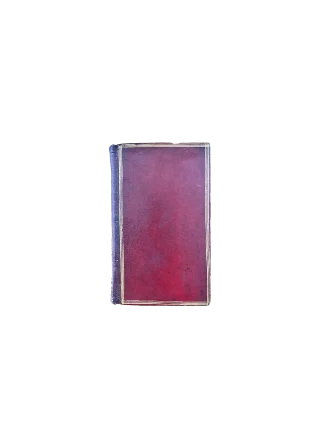AUGUSTA, Eudocia; FALCONIA, Proba; NONNUS OF PANOPOLIS.
BY EARLY CHRISTIAN WOMEN
Homerici Centones [...] Virgiliani Centones [...] Nonni Paraphrasis Evangelii Ioannis.
[Geneva], Henri Estienne, 1578.£2,400.00
16mo. 3 parts in 1, pp. [8], 73, [5], 28, [4], 247, [1]. Greek Letter, with Roman. Printer’s device to title, decorated initials and ornaments. Slight age yellowing, title a trifle dusty, minor bleeding from fore-edge paint to a8. A very good copy in elegant early C18 French crimson morocco, trible gilt ruled, inner edges gilt, spine gilt, gilt-lettered green morocco labels, marbled eps, a.e.g. C18 armorial bookplate of Thomas South to front pastedown, R.J. Hayhurst bookplate, red-ink ms ‘2889’ and pencilled autograph ‘JA Natwood 1859’ to ffep, 1803 ms acquisition note to fly, early C17 ms French Jesuit ownership and shelfmark to title (faded).
A charming copy of the first Estienne edition, the first to include this combination of texts, of this important florilegium of early Christian Greek and Latin poetry. The first work, ‘Omerokentra’, epitomizes Christian re-readings of Homer. In the Preface, Estienne explains that he sought to satisfy the wish of the ‘Friends of Homer’ (i.e., scholars and philologists) who could not get hold easily of Aldine and German editions. Homeric ‘centos’ were short poems, with a thematic title, made up entirely of Greek verse taken word by word from the ‘Odyssey’ and the ‘Iliad’. Written by Eudocia Augusta (5thC), wife of Emperor Theodosius II, these Greek ‘centones’ include poems which reflect on topics such as God, the Holy Trinity, the Wedding at Canaa and Lazarus, by using only direct quotes from Homer. Part II comprises ‘Cento Vergilianus de laudibus Christi’, produced from Virgilian lines (with only minimal variations) by Proba Falconia (Falconia Betitia Proba, 4th cent.), the earliest female Christian poetess whose work survives. The poem includes stories from the Old and New Testament. Part III comprises the paraphrasis of St John’s Gospel by Nonnus of Panopolis (c.5thC AD), an important witness to the Greek poetry of late antiquity, here accompanied by a Latin translation. A charming, exquisitely bound pocket edition of important texts for the literature of Christian humanism.
Thomas South (fl. C18) of Gosport, Hampshire, was a collector of spiritualist, alchemical and hermetic texts, as well as philosophical and classical works. A work like ‘centones’ – presenting spiritual interpretations of classical works – was very apt in his library. He was the father of the hermetist Mary Anne Atwood (b.1817), and the author of an alchemical poem. His daughter, with whom he collaborated, wrote ‘Suggestive Inquiry into the Hermetic Mystery’ published anonymously in 1850. Most copies were burnt by them for fear they had revealed too many secrets.
Renouard 147:4; USTC 450766; Gilmont 2678.In stock







